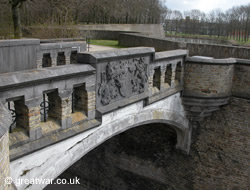Ramparts Cemetery (Lille Gate), Ieper, Belgium
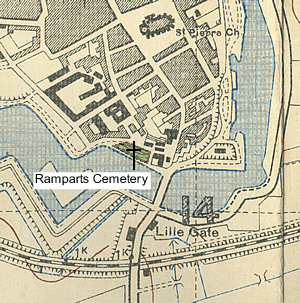
|
Ramparts Cemetery was begun in November 1914 with French soldiers being laid to rest here. At that time a detachment of the French Army was positioned in Ypres and on the Allied Front Line to the north and north-east of the city. French soldiers were using the protection of the fortified ramparts to provide shelter and living spaces near to the Lille Gate.
From February 1915 to April 1918 Ramparts Cemetery was used by Commonwealth Forces. Most of the 1915 casualties buried here were killed in February, March and April and then in July and August of that year. The casualties from 1917 include a number of Australian and New Zealand soldiers.
After the Armistice in November 1918 the French graves were removed from Ramparts Cemetery. The French soldiers would most likely have been reburied in a French National Military Cemetery.
There are 198 Commonwealth graves in the cemetery, of which 188 are identified casualties. The cemetery was designed by Sir Reginald Blomfield.

Sapper William Scholz, Aged 17
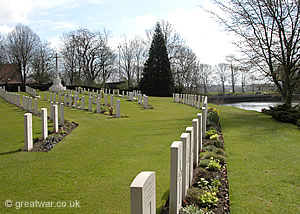
|
One grave from early in 1915 is for that of Sapper William John Scholz of the Royal Engineers. He was serving with the 1st/1st (North Midland) Field Company which was attached to the 28th Division. Sapper Scholz was 17 years old at the time of his death. According to military regulations a soldier was eligible to enlist from the age of 18 and was not to be sent overseas on active service until he was 19 years of age. William Scholz is listed in Soldiers Died in the Great War 1914-1918 as having enlisted in his home town of Smethwick, Staffordshire. He was the son of Charles and Sarah Scholz of 11 St. Mathew's Road, Smethwick, Staffordshire. His grave is in Row F, Grave 17.
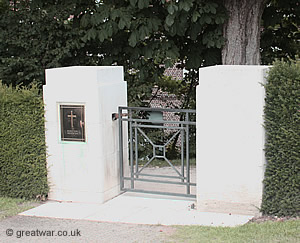
|
Another soldier who also enlisted in Smethwick and who was serving in the same Field Company as William Scholz was Sapper C Kinson. He died of wounds that same day. It might be presumed that they had been friends who had joined up together. Their military service numbers are close, with William's number being 464 and Sapper Kinson's number being 565. He was taken to Poperinghe for medical attention but died of his injuries. He is buried in Poperinghe Old Military Cemetery in Poperinghe (Plot II, Row O, Grave 11).
Access to Ramparts Cemetery
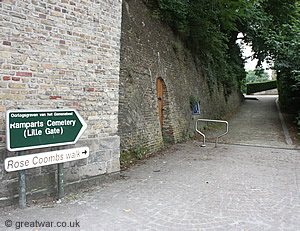
|
The cemetery can be accessed from the main street of Rijselstraat at the Lille Gate via the path named Rose Coombs Walk. This is a gentle sloped path avoiding steps and is suitable for wheelchairs. Or, if you are already walking on the ramparts path either from the Menin Gate or from the direction of the railway station, the gate to the cemetery is located on the ramparts path.
Location
Ramparts Cemetery, Lille Gate, 8900 Ieper, Belgium
Latitude 50.844596; Longitude 2.889437
The cemetery is located on the ramparts of the old fortress fortifications in the south of the city. There is parking available in nearby streets or it is about 10 minutes' walk along the Rijselstraat from the Grote Markt (market square).
Related Topics
Lille Gate (Rijselpoort)
The Ramparts Cemetery is located next to the Lille Gate (Rijselpoort) at the southern exit of the town:
Rose Coombs' Walk
The path to Ramparts Cemetery is named after the author and historian Rose Coombs. Rose wrote the first modern, illustrated guidedbook to the battlefields of the Western Front, entitled Before Endeavours Fade. See our page about guidebooks for more information about this book and other battlefield guidebooks:
Guidebooks for the WW1 Western Front Battlefields: Before Endeavours Fade
Cemeteries and Monuments in the Ypres Salient
Cemeteries in the Ypres Salient
Monuments and Memorials in the Ypres Salient
Acknowledgements
Some of the cemetery description and history has been sourced by kind permission of The Commonwealth War Graves Commission (CWGC). For more information about the cemeteries and the work of the commission visit the CWGC website:
Website: www.cwgc.org

